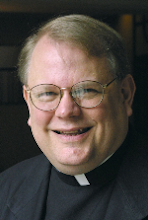
Fourth Sunday of Advent
Homily
Almost a hundred and fifty years ago, a young student of theology, his father was a Lutheran pastor, began to reflect on the meaning of the new scientific study of the sacred scriptures. Contradictions in details about the life of Jesus among the various Gospel accounts, first attempts to trace the development of the New Testament from oral to written forms in various communities, and a growing skepticism which emerged from post rationalism, all drove young Frederick Wilhelm to begin to doubt that there was a God at all.
He would go on to be a famous philosopher and was the first to use the term Gott ist tott, or God is dead. Of course, what he meant was not that God had lived and died, but that God never was. That he was a figment of our imagination, but a fulfillment of our longings, and an incarnation of our dreams.
Such a view lies, I would suggest, at the heart of most of our society’s problems today. For if there is no God, no creator, there is no sense to it all...no cosmic or physical order, no absolute values, no objective and universal moral laws. There is nothing...nihil....only me and you.
And everything, in such a vast wasteland, is up for grabs. My behavior is determined not by trying to do what is right, but by what is expeditious. My goal is not giving, but taking as much as I can. My purpose in life is to die with the most toys and have the most fun whole accumulating my fortune.
Such a hellish secular wasteland is characterized by alienation, aloneness, and a seething sense of rage....is that all there is? ....cultural referents....
Is there anything more desperate, pathetic, or fearsome than to see myself alone and afraid, the breath sucked out of me by the meaningless of it all, my future filled only with the prospect of fear and trembling and sickness unto death.1
Which is why we so desperately need Christmas. For it precisely into the cold, stark desolation of the darkest nights of our souls that God comes. And not just as a visitor or a stranger. No, he takes on human flesh, he becomes one of us in all things but sin in the ultimate act of love.
Nietzsche was wrong. Dead wrong. For God is as close to us as the breath he created, the heart he makes to pump with blood, and the desires and joys which flood every sinew of our being.
God not only is, but he is Emmanuel. He is God with us. We have seen him and heard him and he has touched us. We eat his body and drink his blood. He forgives our sins and anoints us with healing oil. He joins us in marriage and ordains us as Priests, he baptizes us in the saving waters and saves our lives. He destroys death and sin and sadness and will raise us up on the last day.
Last week I spent some days in a pre Christmas retreat. And one morning, sitting on the hard wooden pew of a Church I've been visiting for the past forty years, I stopped my prayer and I stared at the little red light by the tabernacle. I've been staring at that light for most of my life. As a curious little kid about to make his first Holy Communion, as a rumpled long haired teen, as a searching young adult, as a seminarian in a country far from home, as a young priest, and all through the years. I've changed, the world has changed, everything around me has changed, except for that little red light and he who dwells in the tabernacle beside it. He lives here in this Church and in my heart and in my life. I know his consoling presence and the challenge of his Gospel. He is my life, my hope, my salvation and my joy. I know him and he lives!
He is Emmanuel. As real as a baby in a crib. As real as a man on a cross. As real as the Lord risen from the dead. As real as the Christ who will return on the last day to lead us home.
Which is why this season is such a wonder. In the depths of winter, when darkness and cold and black ice are all around us, threatening us, tempting us to despair, and trying to convince us that Gott ist tott, the sun of justice rises and leads all wise men to a little child in a virgin's arms. And suddenly we see his light at it's rising and we know that we are not alone...that we will never be alone, ever again.
For the last ten years of the nineteenth century, Frederick Nietzsche suffered a series of mental breakdowns, finally dying silently in the care of his sister Elizabeth. While no one will know if his mental state was genetic or related to his philosophical speculations, one of his contemporaries lamented at Nietzsche’s death that a man who makes himself God can only go mad.
May God have mercy on Frederick's soul. And on all the lost souls who continue to believe that God is gone, and we are alone.
For we profess not simply happy holidays in the midst of a cold spell, but Emmanuel, God incarnate, the Christ, the Messiah, the king of the universe, who became flesh for us in Bethlehem, who was deified and rose for us in Jerusalem, that we might know how to live and love and cling to in Worcester all the days of our lives.
Monsignor James P. Moroney
Rector

